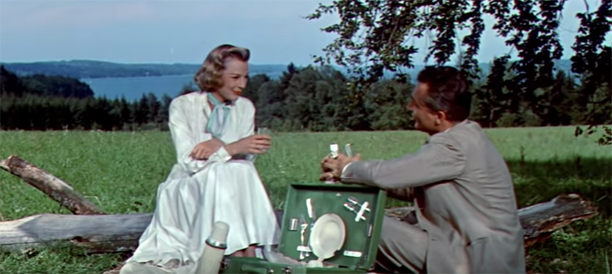Sirk’s Interlude is ninety minutes of adultery that ends when Helen says, “We have no chance. It’s impossible,” and Tonio replies, “You are right.”
Salzburg is all sunshine when Tonio takes Helen for a picnic in his red Mercedes-Benz convertible. A fairy tale or a picnic? Tonio says, “And I know the right place.” Helen and Tonio chatter tensely. Helen drinks white wine poured from a straw-covered chianti bottle, but there is no other picnic food.
Midway through, it rains, signifying their romance will end unhappily. But the film is only half over, and Helen and Tonio will surely make love.
Sirk based his film on John M. Stahl’s When Tomorrow Comes (1939 based on James M. Cain’s story “A Modern Cinderella,” which does not have a picnic. But Stahl added a picnic on a sailboat, the pleasure of which ends with a rising squall. Stahl’s ending is a tear-jerker: I’ll be back,” says Philippe, and “I’ll be waiting,” replies Helen.
A remake of the film by Kevin Billington (1968) added more suds. Now, Stefan Zelter (Oskar Werner) drives a gray Bentley to picnic on the grounds of Bodium Castle. He and Sally (Barbara Ferris) cuddle and drink champagne. It doesn’t last. The unhappy lovers part, “I understand, she says.”
Featured Image: June Allison as Helen Banning and Rossano Brazzi as Tonio Fischer
See Douglas Sirk. Interlude (1957). The screenplay by Daniel Fuchs and Franklin Coen, adapted by Inez Cocke and Dwight Taylor, is based on James M. Cain’s “A Modern Cinderella” Kevin Billington. Interlude (1968). The screenplay is by Lee Langley and Hugh Leonard; John Stahl. When Tomorrow Comes (1939). The screenplay by Claude Taylor is based on James. M. Cain’s “A Modern Cinderella”; Tom Ryan. The Films of Douglas Sirk. Jackson: University of Mississippi Press, 2019. Cain’s story was not published until 1951 as “The Root of His Evil.”

